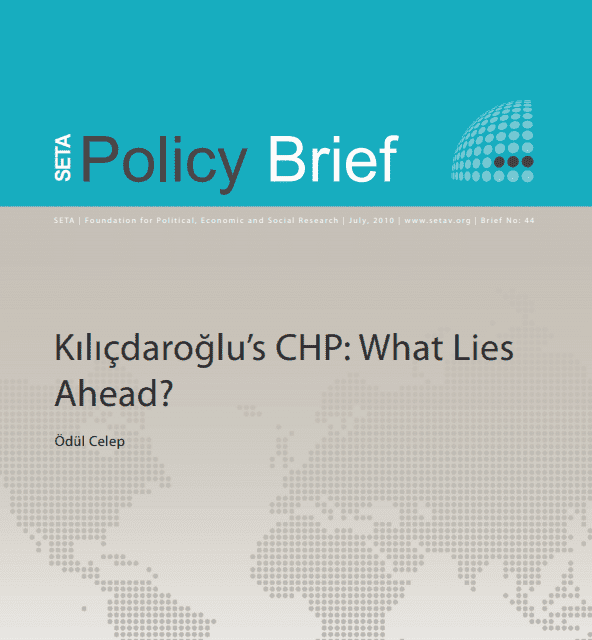Kilicdaroglu’s CHP: What Lies Ahead?

By Ödül Celep
Policy Brief, No. 44, July 2010
The unexpected switch of the CHP’s leadership from Deniz Baykal to Kemal Kılıçdaroğlu led to a series of debates about the party’s political future.
The unexpected switch of the CHP’s leadership from Deniz Baykal to Kemal Kılıçdaroğlu led to a series of debates about the party’s political future and its new place in the party system of Turkey. Most of the debates have focused on what exactly changed and what remained the same as a result of this switch. Kılıçdaroğlu’s speeches revealed signs for new directions in CHP’s discourse indeed, as they included novel issues such as intra-party democracy and empowering the party’s women and youth branches. The purpose of this policy brief is to propose ideas to the CHP as a socialdemocratic party, so it can be a serious political alternative to the conservative AK Party. The CHP’s major target should be democratization to be achieved at two different levels: (a) institutional and (b) ideological. Institutional democratization requires establishing intra-party democracy, decentralization of power, as well as bringing ideological heterogeneity and political debates back to the party. Ideological democratization is about bringing ‘the left’ back to Turkish politics by embracing a progressive and social democratic discourse. This entails moving leftwards, a de-emphasis of nationalism and the adoption of a more egalitarian, less elitist, more libertarian, and more multiculturalist world vision.
Introduction
The unexpected switch of CHP’s leadership from Deniz Baykal to Kemal Kılıçdaroğlu in late May 2010 led to a series of debates about the party’s political future and its new place in the Turkish party system. Most of the debates have focused on what exactly changed and what remained the same as a result of this switch. The most apparent source of information and evidence about change was Kılıçdaroğlu’s speech at the party congress (on May 22, 2010) where he was elected the chairperson with 1189 out of the 1197 delegates’ votes. His speech revealed signs for new directions in CHP’s discourse. In contrast to Baykal, Kılıçdaroğlu did not overemphasize ‘secularism’ and did not attempt to depict the AK Party as a threat to the existing regime. His speech included novel issues such as bringing intra-party democracy, empowering CHP’s women and youth branches, and abandoning the ten percent national threshold in parliamentary elections.
Kılıçdaroğlu’s speech triggered different opinions. Some sources found the changes expressed in Kılıçdaroğlu’s speech reasonable while others argued that these changes were insufficient to transform the CHP into a new party. Some scholars went as far as denouncing Kılıçdaroğlu’s speech for reflecting almost the same, old Baykal mentality. It is yet too early to know whether CHP is undergoing real changes and to what extent these changes have altered the party’s platform. It is true, however, that CHP should develop a deliberate strategy of change if its new leadership wants to be a viable alternative to the ruling AK Party. Therefore, the message that the CHP is a changed party is critical because it could directly translate into an increase of votes in future elections. If the CHP were to become a viable political alternative to the AK Party, it could bring the contemporary Turkish party system closer to a more balanced two-party model. This political dynamic is healthier for Turkey as a democracy than a predominant party system led by one party, the AK Party.
The purpose of this policy brief is to propose ideas to the CHP as a social democratic party, so it can be a serious political alternative to the conservative AK Party. CHP’s major target should be ‘democratization,’ which can be achieved at two different levels: (a) institutional and (b) ideological. The democratization of CHP as a political party is likely to contribute to the democratization of Turkish politics as a whole. Since 2002, Turkey has been ruled by a single party with no electorally challenging opposition. Baykal’s CHP has been the major opposition party. However, it has substantially lagged behind the AK Party in electoral terms. If Kılıçdaroğlu’s CHP is able to democratize and at the same time increase its vote share, it could become a driving force of democratization in Turkey. Therefore, its objectives should be two-fold. First, it must appeal to the electorate and find a platform that challenges the AK Party’s chances of maintaining its single-party government status. Second, it should develop a social democratic agenda that goes beyond what the AK Party has achieved thus far. A democratic CHP would have credibility to critique the AK Party ‘from the left.’




















